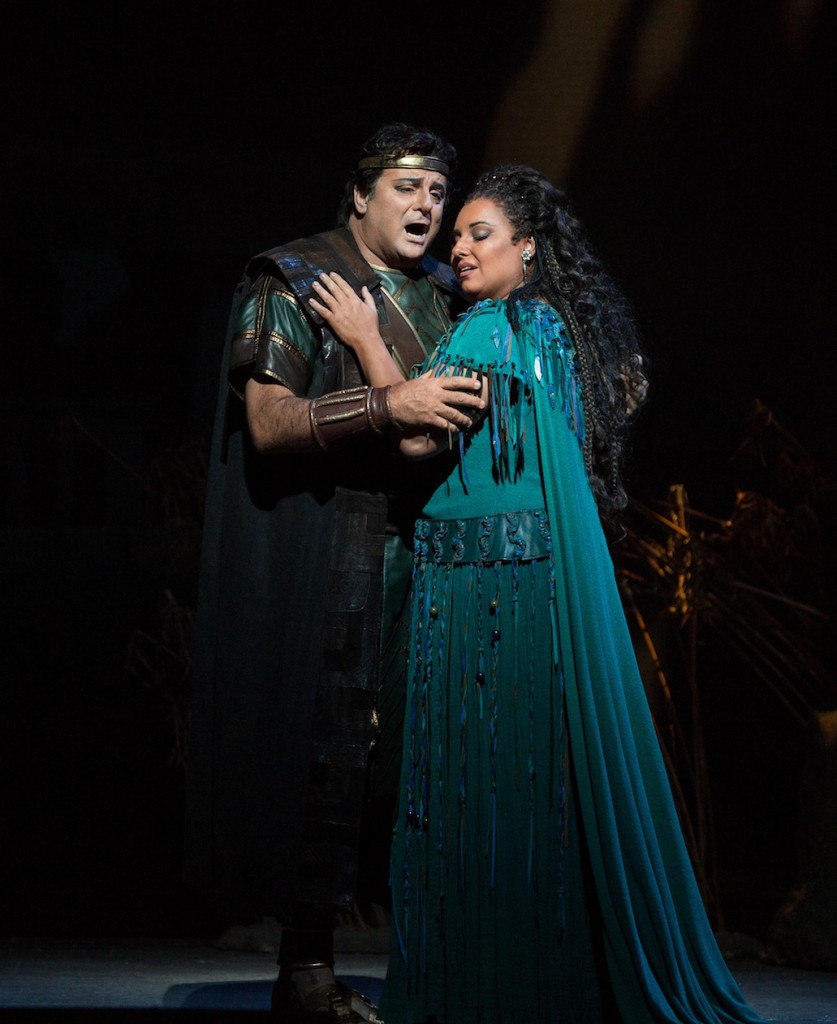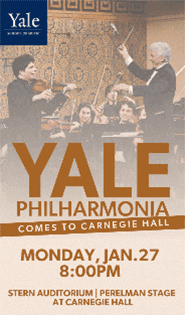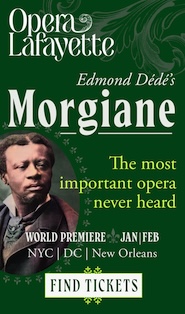Indifferent vocalism entombs Met’s “Aida”

Marcello Giordani and Liudmyla Monastyrska in the Metropolitan Opera production of Verdi’s “Aida.” Photo: Marty Sohl
If the Zeffirelli La Bohème is the quintessential “classic” production in the Met’s current repertory, then perhaps none is more representative of the company’s unmitigated and unmatched spectacle than Sonja Frisell’s 1988 staging of Aida. From its countless supernumeraries, to its live horses (one of which was intent on stealing the Triumphal March with its restless antics), to its handsomely painted sets, and stage-elevator coups de théâtre, it takes the magnificent art form to its illogical, goofy, and grandiose extreme.
This production, carried by a solid cast, can be a thrill to watch; but when there is no one to keep it moving, as was the case in the season premiere on Thursday, it seems an empty Fabergé shell.
Let’s begin with the good: The finest vocal performance of the evening was one to which we couldn’t even put a face. Lori Guilbeau’s singing as the high priestess was clear and taut; in her invocation of Ptah, we could hear chilling intensity in her voice even from offstage.
Soloman Howard made an excellent debut as the King of Egypt, filling the stage with his booming voice and imposing presence. Another strong bass, Dmitry Belosselskiy channelled both wisdom and menace into Ramfis. And Željko Lučić sang the conquered king Amonasro with nuance, his voice supple yet muscular and smoking, his portrayal giving dignity to the role.
Otherwise, there was little for the audience to cheer about, as the principals did not fare so well. Though the two leading ladies’ voices complemented each other nicely, neither impressed in her own right.
In the title role, Liudmyla Monastyrska occasionally displayed a lovely soft voice, but for the most part was hard and overly forceful; listening to her was like being splashed in the face with a glass of ice water. Her Italian was indecipherable.
As Amneris, Olga Borodina came on strong towards the end, seeming genuinely torn and infusing urgency and electricity into her rendition of the aria “L’aborrita rivale” . Her earlier work, though, was unrewarding—her voice sounded covered, her attacks were blared, and she had to clamber over much of the part.
Marcello Giordani, Thursday’s Radamès, has enjoyed a long and respected career at the Met, but his recent years has been hard to watch (and hear). At this point he has practically no bottom to speak of, and things aren’t much better higher up—tone is unsteady, pitch is unsure, and Thursday’s entire performance felt like a struggle. His vibrato sounded anything but natural, and while he managed to grab most of his high notes, there was always a sense of dread as he approached them, with a feeling of relief afterward.
Moreover, there was almost no dramatic spark to be found among the main trio. Giordani, as is his wont, stared at the back of the house from the apron for practically the entire evening, save in the second scene of act one, in which he was directed to stare at the back of the stage instead. That left Monastyrska precious little to work off of, though in her own right she was a very picture of stoicism in the passionate “O patria mia.” And until that Act Four aria, Borodina seemed to have no real interest in Radamès beyond a petty desire to put her rival in her place.
Marco Armiliato’s conducting was inconsistent, though he had his moments of brilliance. His account of the Prelude began with a gorgeous, tender hush and unfolded into a lush landscape. The triumph scene, by contrast, was led as though by rote, and nearly fell apart by the end.
In the very first scene, as the stagehands prepared the first big reveal of the temple interior, the massive door in front began to teeter back and forth. It ultimately stayed up, but it appeared that the whole thing could come crashing down in an instant. To say this was an apt metaphor for Thursday’s performance would be overstating the point, but on a night like this one, a set mishap would not have felt out of place.
Aida runs through April 20. Tamara Wilson sings Aida and George Gagnidze Amonasro, from December 26; Oksana Dyka sings the title role starting April 9. metoperafamily.org.



Posted Nov 02, 2014 at 1:29 pm by Carolyn Law
I don’t think I have ever read a more mean-spirited review. I cannot condone this type of review and therefore will no longer read any reviews published by The Classical Review.
I attended this performance and enjoyed it very much. The reviewer is entitled to disagree and express that viewpoint, but not with the malicious comments about individual performers used in this article.
Posted Nov 02, 2014 at 4:31 pm by Joe Maggio
I have been saying Giordani is indifferent for years.
Posted Nov 03, 2014 at 10:22 pm by CastaDiva
The Met’s Aida puts me in mind of a restaurant with a good view. The restaurant knows it can get away with serving middling quality fare because customers will come for the setting. Similarly, the Met’s Aida. It is a grand production, indeed. None other than the baritone Ambrogio Maestri, the reigning Falstaff, has ruefully remarked that no Italian house puts on an Aida like the Met’s. I first saw this production in 1989, with Domingo as Radames, and was duly impressed. I have since seen it twice, and both times the performances fell flat, for the reasons you state: lack of dramatic cohesion, and listless singing by the principals. But it needn’t and shouldn’t be so. With a strong cast and proper direction, this opera could be the marvelous show it was meant to be. Perhaps it will do better with the alternate casts scheduled to sing it this season.
Posted Nov 08, 2014 at 10:47 am by Waquoit
What I don’t understand is why this production has 2 forty minute intermissions. Is there a technical reason for this? It seemed like they were waiting for the folks in the Grand Tier to finish their dessert.
Posted Nov 27, 2014 at 6:27 pm by JessPlainsong
I have to concur with the reviewer. What a terrible production. Mostly I wanted to slowly throttle the director at the same glacial pace as he/she directed the mostly indifferent leads. Who couldn’t act. I wish I had bothered to read the reviews before seeing the production. The horse was the highlight for me. And I LIKE opera. There is so much in the music that is visceral, desperate and dramatic, but none of that was to be found in this production. It was like a heritage production from the 70s. Time to retire it now.